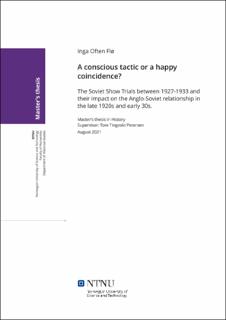A conscious tactic or a happy coincidence? - The Soviet Show Trials between 1927-1933 and their impact on the Anglo-Soviet relationship in the late 1920s and early 30s.
Master thesis
Permanent lenke
https://hdl.handle.net/11250/2779939Utgivelsesdato
2021Metadata
Vis full innførselSamlinger
Sammendrag
Denne oppgaven drøfter utviklingen av de ”falske rettsakene” i Sovjetunionen gjennom perioden 1927-1933, og hvordan de påvirket det Anglo-Sovjetiske forholdet. Drøftelsen er sentrert om fem hovedrettsaker innenfor denne perioden; Leningrad-saken (1927), Shakhty-saken (1928), Saken om de tre sjefene (1929), Industriparti-saken (1930) og Metro-Vickers saken (1933). De sovjetiske styresmaktene arresterte og dømte hundrevis under påskuddet om at de drev antisovjet- og sabotasjeaktiviteter i den gitte tidsperioden. Gjennom denne prosessen lyktes styresmaktene i å fjerne den politiske opposisjonen til Stalins regime, og å sikre seg vesentlig kontroll over nasjonen i sin helhet. Oppgaven analyserer den historiske betydningen av rettsakene, innenfor rammene av det Anglo-Sovjetiske diplomatiske forholdet. Et særlig fokus vies til forviklingene innen Anglo-Sovjetiske politiske intriger og propaganda i mellomkrigstiden, og hvordan denne kan tolkes i lys av korrespondansen til den norske Chargé d’affaires, Andreas Urbye, og fra den britiske regjering og utenriksdepartement i perioden. This thesis discusses the development of Soviet show trials in the time period 1927-1933 and how they influenced the Anglo-Soviet relationship. The discussion centres around five main trials set within this timeframe: the Leningrad Trial (1927), the Shakhty Trial (1928), the Trial of the Three Chiefs (1929), the Industrial Party Trial (1930) and the Metro-Vickers Trial (1933). The Soviet Government arrested and sentenced hundreds of people on accusations of anti-Soviet and wrecking activities during this time, successfully removing oppositional forces and gaining substantial control of the nation. This thesis analyses the historical importance of these trials, within the framework of Anglo-Soviet diplomatic relations. With a particular focus on the communiques of the Norwegian Chargé d’affaires, Andreas Urbye, as well as the British Cabinet and Foreign Office, it explores the intricacies of Anglo-Soviet political intrigue and propaganda in the inter-war period.
